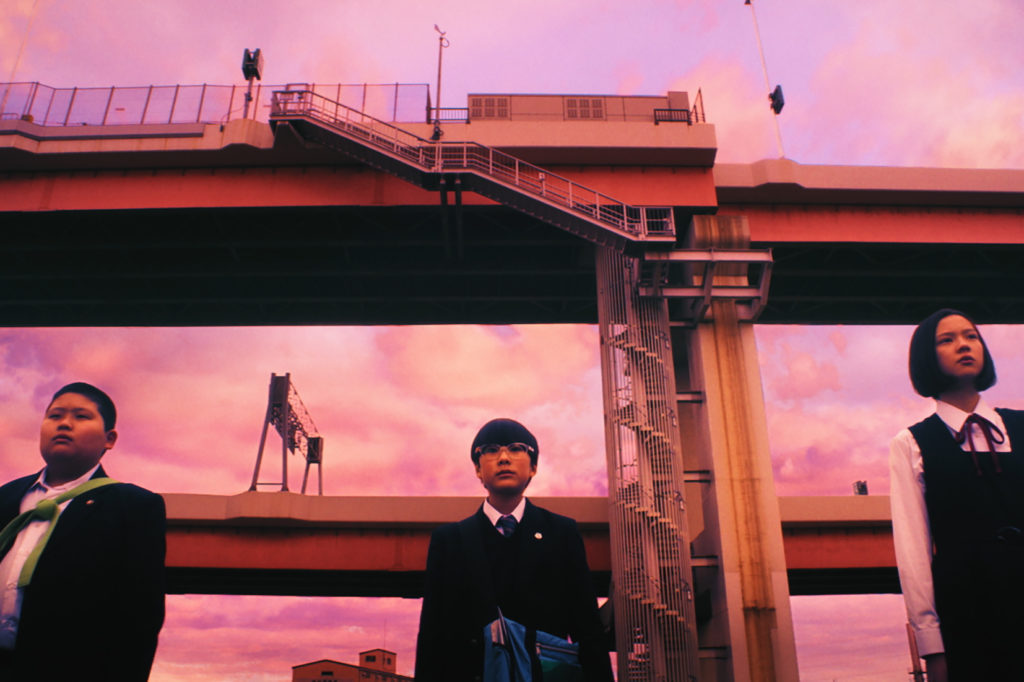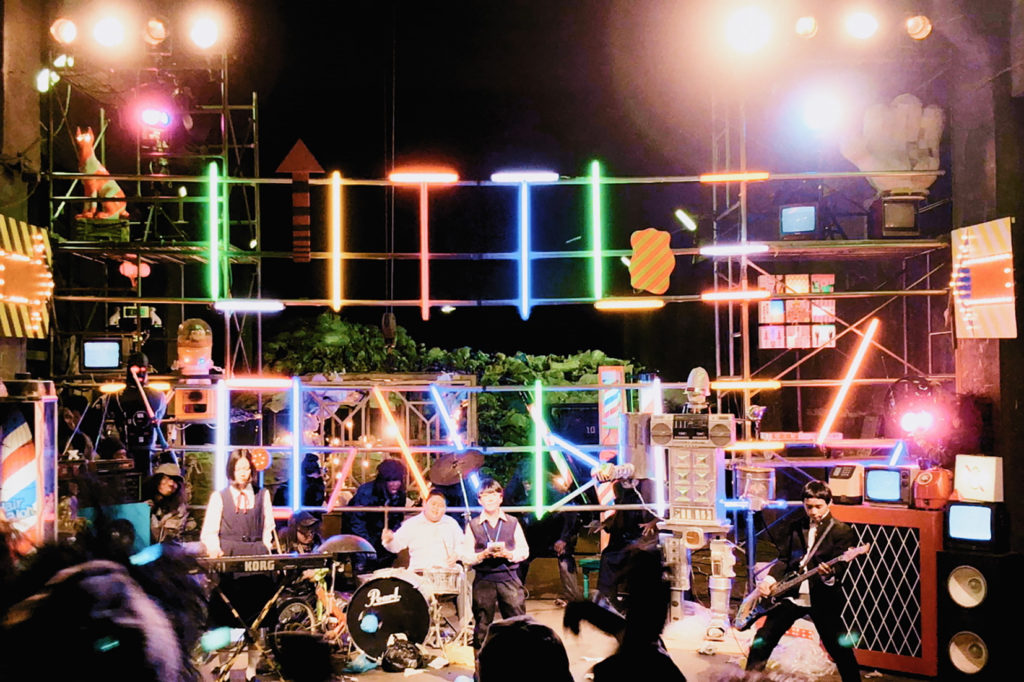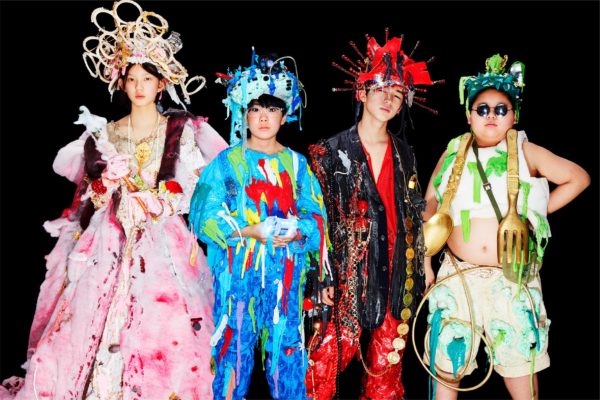Hitting cinemas—both live and via the virtual theatrical model (list of participating theaters here)—Friday, July 10, Oscilloscope release We Are Little Zombies tells the story of four friends with an unusual meet-cute: the parents of newly orphaned teenagers Hikari, Takemura, Ishi, and Ikuko are all cremated together. Unable to confront his grief, Hikari (Keita Ninomiya of Hirokazu Kore-eda’s Like Father, Like Son) escapes with his new friends into the world of an 8-bit video game, forming a band and rocking out on the subject of emotions (and the lack thereof).
At once deadpan and deliriously psychedelic, We Are Little Zombies is the debut feature of writer/director Makoto Nagahisa, whose short And So We Put the Goldfish in the Pool won the Short Film Grand Jury Prize at Sundance in 2017. Mixing music, fashion, and retro ’80s stylings in his story of grief and recovery, We Are Little Zombies marks the arrival of an innovative new talent on the international film scene. Below, Nagahisa speaks with Boxoffice Pro.
I find We Are Little Zombie’s portrayal of childhood to be so poignant—it shows the resiliency of the four child characters, as well as the trauma they go through, without being overly sensationalistic or melodramatic. Are there things you don’t like about the way other storytellers portray childhood?
I think it’s way more natural—especially when reality is hard—to try and hold your emotions in and keep calm. Reality cannot hurt if you refuse to face it. I think that’s a very natural defense mechanism. Honestly, it’s why I’m so regularly annoyed by scenes in movies where family, friends, and lovers are sobbing and dying. I get that certain audiences like that, but I feel strange about creating stuff like that. I believe that children have more vision, intelligence, and imagination than their adult contemporaries. And with that in mind, I don’t enjoy teen movies about idiotic school kids who are ignorant, shameless, and/or blinded by sex. I think of every teenager as a deep thinker—even if it doesn’t appear that way upon first glance.
Obviously, things are slowed down a lot right now due to coronavirus—but is there a future project you’re working on? What have you been doing over the past few months?
I’ve actually written a screenplay about a group of people who live in a house and are having a party amidst the Covid-19 pandemic. We plan on performing it as a stage play in the near future. Also, in the midst of all this social turmoil, I’ve written a story about lovers who are struggling to capture their happiness. It’s a rather tragic love story. I’m currently looking for a partner to turn it into a film with me. And, in addition to all that, I’m planning on creating an animation for children. I really hope that the younger generations will be able to convey the values they need to survive.

Were you inspired by your own children in writing and directing We Are Little Zombies?
The story was initially conceived just as my second daughter was being born. I came up with the idea while she was playing in a park. It just hit me. The catalyst for the film would be what to do to prevent the despair of my two daughters growing up in this world… in this society Also, by living with my two daughters, I learned to see the world from a child’s perspective. I removed my common sense and baseline. That shines through in the film’s plot, but also, for example, in its wild, unexpected camera angles.
What was the inspiration behind building We Are Little Zombies around a retro-style video game? Is it just that you liked the aesthetic, or is there some other meaning there?
This was born from my childhood, as I was bullied in my youth. Whenever I was having a difficult time, I would avoid the pain and force myself to survive by looking down on myself from the perspective of a role-playing video game. I loved it. I imagined my interactions with bullies and unpleasant adults as a fight with monsters, and by applying that filter, I was able to avoid reality and survive on my own terms. My film staunchly rejects reality, and its game-like developments and techniques convey my childhood method of avoiding despair.

Children are often ignored or taken advantage of by adults in We Are Little Zombies—the four main characters drift through a world where no one pays much attention to them, except where there’s the potential to make money. I’m wondering what the inspiration is behind that—were you trying to make a commentary?
I did think because I believe grown-ups only think about things that convenience them. Otherwise, adults are adults—and most can’t focus in fast-moving society. I’ve worked in advertising for fifteen years and regularly interacted with adults who would solely prioritize their convenience and ignore all else. The adults in my film echo this.
Who wrote the music for this film? I can’t get “We Are Little Zombies” out of my head! It’s such a great song.
I asked a band from Brooklyn, New York called Love Spread to help me create the themesong to the film, “We Are Little Zombies”. The tune was written by Machida Ryota, and the lyrics were written by me. Here’s a clip of more Love Spread music:
I was a big fan of theirs, and I just DM’d them on Twitter and said “It’s nice to meet you! Let’s do this thing together!” Their band’s unique sound was originally used for a game console, and that served as a catalyst for further emphasizing this aspect of the film. But just before we wrapped the film in November of 2018, Ryota unexpectedly died. I was crushed with sadness. I ask that anyone in The United States who watches my film, please play it as loud as humanly possible. Let his song roar so loudly that it reaches all the way to Heaven. When I look at all of the cinemas that will be screening the film, it almost feels like a national tour for Love Spread, even though the band no longer exists
Can you tell me more about Yoshikazu Yamagata, who did the band costumes? I know he’s a fashion designer, and this is their first film credit—how did you come to work with him?
Yamagata-san is one of my favorite fashion designers, and I emailed him, saying, “I love your work! Let’s make this amazing thing together!” I now own a lot of the clothes he makes. It’s so wonderful. I think that creating something with people you love is one of the best ways to make great art. I was inspired to do this by the legendary Chilean filmmaker Alejandro Jodorowsky, who has always made it a point to work with his friends.



Share this post